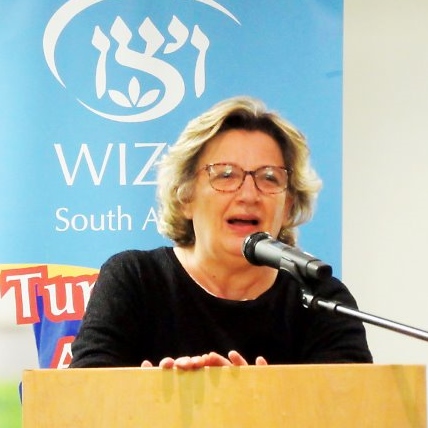click to dowload our latest edition
CLICK HERE TO SUBSCRIBE TO OUR NEWSLETTER


Published
6 years agoon
By
adminMOIRA SCHNEIDER
“I hope it will be okay. I am used to it. In 2004, Israel killed a terrorist – I was in Prague and was boycotted by [South African writer and activist] Nadine Gordimer. She didn’t want me to help her with her luggage.”
While here, Castel-Bloom launched her latest work, An Egyptian Novel, under the auspices of the Jacob Gitlin Library, the SA Zionist Federation (Cape Council), WIZO Cape Town and the Israeli embassy. The book, which is semi-autobiographical, delves into her family’s origins. In 2015, it was awarded the Sapir Prize, Israel’s equivalent of the Man Booker Prize.
Castel-Bloom has been hailed as a leading voice in Hebrew literature who is constantly expanding the boundaries of the Hebrew language as well as narrative style. Her mother tongue is, in fact, French, which she spoke exclusively for the first three years of her life.
“Maybe because of that I have the capacity to observe the Hebrew language from the outside,” she muses. “Of course, it also gets wear and tear over the years. When language is alive, you have changes all the time. The new generation brings changes. Slang is changing.
“I don’t want to act as if I’m 20 years old or write that way – I’m almost 60,” she says.
She does, however, credit her students in creative writing at the Bezalel Academy of Arts and Design in Jerusalem for keeping her abreast of current usage, which she incorporates into her writing.
She insists that parts of An Egyptian Novel are “totally invented”, even though it documents her family’s journey.
“The truth is that my father’s family, the Castels, left Spain during the Inquisition. Seven brothers took a boat and arrived at the Gaza coast. They settled there – at that stage there were a lot of Jews there – but were expelled by Napoleon in 1799.”
They went to Hebron, where Castel-Bloom’s grandfather was born, but left for Egypt in 1915 “because he didn’t find a beautiful woman to marry and there was not enough food. By leaving, he was saved from the Arab riots of 1929 and 1936.”
Her mother’s side were Egyptians for generations, based in Cairo. The family left for Israel in 1951/2.The story tells of their expulsion from their first stop, a kibbutz, for being “too Communist”.
“But you know, it was a blessing,” she says, “even though they were very depressed after it.”
The family eventually settled in Tel Aviv, where the author was born in 1960. While Castel-Bloom does not hold any degrees – she left Tel Aviv University after a year and was expelled from the Beit Zvi School for the Performing Arts in Ramat Gan for being “unsuitable”. She has taught at the universities of Oxford, Cambridge and Harvard, among others. She is mostly self-taught and has honed her skills through reading “a lot”.
She turned to writing at the age of 25, after the death of her father – as a means of processing it. “Every story was about somebody who died – it was as if I was saying to myself in different ways: ‘He is dead.’”
Castel-Bloom has received many awards, but she singles out the most meaningful. “I got two prizes for lifetime achievement: one when I was 37, the other last March.
“It was kind of a crisis,” she says of the earlier one, “because when you get a prize for lifetime achievement at the age of 37 from a religious university, you think they know something you don’t!”
The Sapir Prize, however, is the most prestigious, she says. “It also helped me a lot financially. To tell the truth, in order to write An Egyptian Novel, I sold my house in 2011. But I felt that I owed it to the previous generations, most of whom are dead.”
Castel-Bloom’s next book deals with Tel Aviv’s centre, a place of theatres, opera and museums, but with a subculture of drugs and homelessness. Evidently, she is unafraid to tackle taboo topics, “especially the army taboo”, and it is possibly for this reason that she was named one of the 50 most influential women in Israel in 1999.
“You raise your child as best you can and then you send him to the army – what kind of a mother are you? Sorry!” she exclaims.
“When my boy was born, I was sure he was not going to go to the army. Then it became obvious he would go. Children born now will have to go to the army. Nothing will happen during our lifetime [to change this],” she says.
In 2002, she was the first Israeli novelist to address the subject of Palestinian suicide bombings from a mother’s point of view. “I did it because the second Intifada was so frightening,” she recalls.
Her post-modern classic, Dolly City, was nominated in 2007 as one of the 10 most important books since the creation of the State of Israel. This is, she reasons, because it deals with how to raise one’s child in a hostile environment.
In summary, she says, her writing reflects the absurdity of life in Israel.
And what motivates her as a writer? “At the beginning, when I was 25, I wanted to change the world. I hope I have done some good for society by lighting up dark places.”
